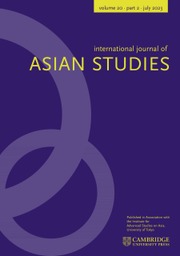Article contents
Manipulating post-Soviet nostalgia: contrasting political narratives and public recollections in Central Asia
Published online by Cambridge University Press: 17 September 2020
Abstract
The vision of the Soviet years in post-Soviet republics varies depending on the government's official master narrative, foreign policy priorities, and general public perceptions of the past. By contrasting the published interviews of presidents Putin, Nazarbayev, and Karimov and the outcomes of in-depth interviews with the elderly public in Central Asia (Kazakhstan, Kyrgyzstan, and Uzbekistan), this paper reveals the differences between the official master narratives of political leadership (positive or negative) with respect to the Soviet past and public attitudes. This paper aims to demonstrate that the narratives of political leaders/governments and public recollections coexist in the same social space in parallel to each other. While governments attempt to use their narratives to promote certain policy goals, people use their nostalgic recollections to make sense of the social changes in their respective countries and use such recollections to interpret their lives.
- Type
- Special Issue Articles
- Information
- Copyright
- Copyright © The Author(s), 2020. Published by Cambridge University Press
References
- 5
- Cited by



